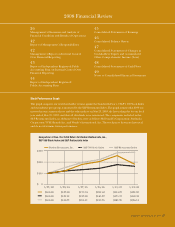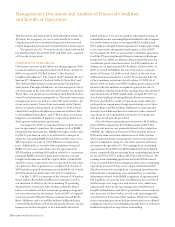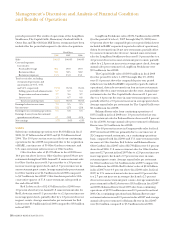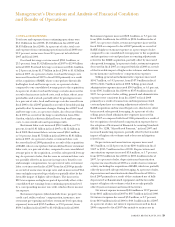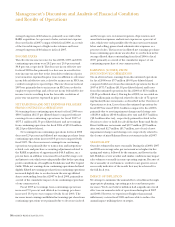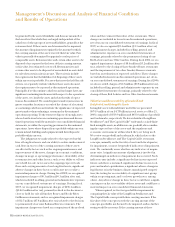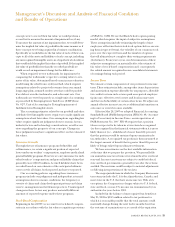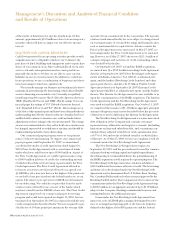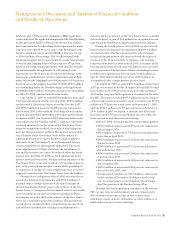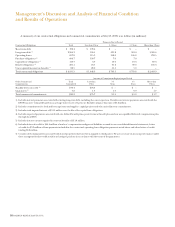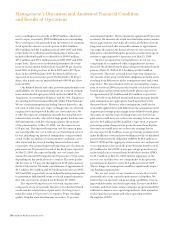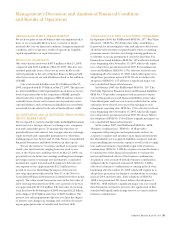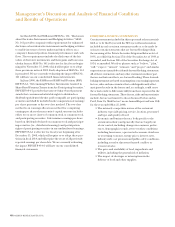Red Lobster 2008 Annual Report Download - page 34
Download and view the complete annual report
Please find page 34 of the 2008 Red Lobster annual report below. You can navigate through the pages in the report by either clicking on the pages listed below, or by using the keyword search tool below to find specific information within the annual report.30 DARDEN RESTAURANTS, INC.
Management’s Discussion and Analysis of Financial Condition
and Results of Operations
average long-term debt balances, primarily as a result of the
RARE acquisition. As a percent of sales, net interest expense
decreased in fiscal 2007 compared with fiscal 2006, as a result
of the favorable impact of higher sales volumes and lower
average long-term debt balances in fiscal 2007.
INCOME TAXES
The effective income tax rates for fiscal 2008, 2007 and 2006
continuing operations were 28.2 percent, 29.0 percent and
30.8 percent, respectively. The decrease in our effective rate
for fiscal 2008 is due primarily to a decrease in our effective
state income tax rate due to the favorable resolution of prior
year tax matters expensed in prior years, in addition to a decrease
in our federal effective rate, related to an increase in FICA tax
credits for employee reported tips. The rate decrease in fiscal
2007 was primarily due to an increase in FICA tax credits for
employee-reported tips and a decrease in our federal effective
income tax rate resulting from the favorable resolution of
prior year tax matters expensed in prior years.
NET EARNINGS AND NET EARNINGS PER SHARE
FROM CONTINUING OPERATIONS
Net earnings from continuing operations for fiscal 2008 were
$369.5 million ($2.55 per diluted share) compared with net
earnings from continuing operations for fiscal 2007 of
$377.1 million ($2.53 per diluted share) and net earnings
from continuing operations for fiscal 2006 of $351.8 million
($2.24 per diluted share).
Net earnings from continuing operations for fiscal 2008
decreased 2.0 percent and diluted net earnings per share from
continuing operations increased 0.8 percent compared with
fiscal 2007. The decrease in net earnings from continuing
operations was primarily due to transaction and integration-
related costs and purchase accounting adjustments related to
the RARE acquisition of approximately $44.8 million, on a
pre-tax basis, in addition to increased food and beverage costs
and interest costs, which were only partially offset by the operating
profit contributions of LongHorn Steakhouse and The Capital
Grille. While net earnings from continuing operations declined
slightly, diluted net earnings per share from continuing operations
increased slightly due to a reduction in the average diluted
shares outstanding from fiscal 2007 to fiscal 2008, primarily as
a result of the cumulative impact of our continuing repurchase
of our common stock.
Fiscal 2007 net earnings from continuing operations
increased 7.2 percent and diluted net earnings per share
increased 13.0 percent compared with fiscal 2006. The
increases in net earnings and diluted net earnings per share from
continuing operations were primarily due to decreases in food
and beverage costs, restaurant expenses, depreciation and
amortization expenses and interest expenses as a percent of
sales, which were only partially offset by increases in restaurant
labor and selling, general and administrative expenses as a
percent of sales. The increase in diluted net earnings per share
from continuing operations was also due to a reduction in the
average diluted shares outstanding from fiscal 2006 to fiscal
2007, primarily as a result of the cumulative impact of our
continuing repurchase of our common stock.
EARNINGS (LOSSES) FROM
DISCONTINUED OPERATIONS
On an after-tax basis, earnings from discontinued operations
for fiscal 2008 were $7.7 million ($0.05 per diluted share)
compared with losses from discontinued operations for fiscal
2007 of $175.7 million ($1.18 per diluted share) and losses
from discontinued operations for fiscal 2006 of $13.6 million
($0.08 per diluted share). During fiscal 2008, we recorded an
$18.0 million gain on disposal related to the sale of 72 operat-
ing Smokey Bones restaurants, as described in the Overview of
Operations section. Losses from discontinued operations for
fiscal 2007 increased $162.1 million compared to fiscal 2006,
primarily due to asset impairment charges and closing costs
of $236.4 million ($146.0 million after tax) and $13.7 million
($8.5 million after tax), respectively, primarily related to the
decision to close or hold for sale all Smokey Bones and Rocky
River Grillhouse restaurants and $12.7 million ($7.8 million
after tax) and $2.7 million ($1.7 million, net of tax) of asset
impairment charges and closing costs, respectively, related to
the closure of nine Bahama Breeze restaurants in fiscal 2007.
SEASONALITY
Our sales volumes fluctuate seasonally. During fiscal 2008, 2007
and 2006 our average sales per restaurant were highest in the
spring and winter, followed by the summer, and lowest in the
fall. Holidays, severe weather and similar conditions may impact
sales volumes seasonally in some operating regions. Because of
the seasonality of our business, results for any quarter are not
necessarily indicative of the results that may be achieved for
the full fiscal year.
IMPACT OF INFLATION
We attempt to minimize the annual effects of inflation through
appropriate planning, operating practices and menu price
increases. We do not believe inflation had a significant overall
effect on our annual results of operations during fiscal 2007
and 2006. However, we experienced higher than normal
inflationary costs in fiscal 2008 and were able to reduce the
annual impact utilizing these strategies.







